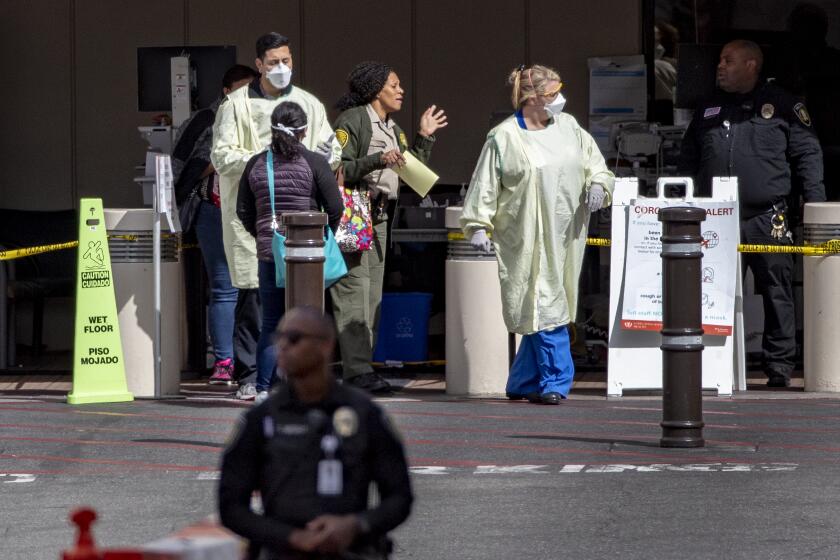Amid PPE shortages, residents raid personal supplies for coronavirus equipment donations
On Sunday night, Chad Loder traversed Southern California in the pouring rain.
He drove from his South Bay home to Palms to pick up N95 masks from a UCLA student. He then dropped off masks and hazmat suits to a grateful doctor in Culver City.
And finally, at the end of the night, he drove more than two hours to a Rancho Mirage hospital to drop off even more supplies.
As hospitals run short of personal protective equipment and the number of COVID-19 patients surges, residents across the country are scouring their belongings for any gear that can be used to help the doctors and nurses on the front lines of the coronavirus pandemic.
âLiterally, hours matter right now,â said Loder, who lives in the South Bay and co-founded an organization called Masks for Docs, where donated supplies are delivered to hospitals. âWe have to just do everything we can.â
On Wednesday, officials from the Los Angeles County Public Health Department said COVID-19 infections are rapidly rising and doctors and nurses were advised to conserve supplies by reusing face masks and wearing expired gowns. Doctors and nurses have told Loder that theyâre using trash bags as protective coverings and bandannas as face masks.
Although private companies have been producing face shields and other paraphernalia, and a healthcare workers union has located 39 million N95 masks, community volunteers often work at a speed unhindered by bureaucracy, with the process as simple as putting out a call for equipment and someone either picking it up or dropping it off at a healthcare facility.
Over the last week, Loder helped build the groupâs website as volunteers began picking up donations and delivering gear to hospitals around the world. In New York City, he said, thereâs a group of motorcycle riders delivering supplies to doctors in alleys.
Masks for Docs has more than 1,000 volunteers. People have been checking their garages, closets and earthquake kits for supplies.
âWeâre just on fire about getting them stuff right away,â Loder said.
Q&A: Hereâs why medical safety supplies are short, and what you can do to help hospitals and first responders who need gear.
Others, like Deyu Kong, an engineer from Santa Clara, have created their own databases, where people can add local hospitals for donation drops.
Kong said that after watching news about the growing pandemic, he wanted to help. He teamed up with UC San Francisco Medical School students and a Los Angeles doctor to build a database and website called DonatePPE.org. Within days, more than 100 hospitals were on the list.
Karen Tsai, an L.A. internist working with the DonatePPE.org effort, was inspired to help after she learned what medical colleagues in New York were facing. Friends told her they were sterilizing used masks and hospitals have resorted to using plastic trash bags as protective gowns. Others are using paper bags to store their masks because they are alllowed only one per shift.
âYou go into work,â she said. âYou expect to get the protection you need. And sometimes you go in, and thereâs nothing left.â
Patty Ahn felt âterrifiedâ after hearing about equipment shortages at the Los Angeles hospital where a relative works.
So Ahn and partner Ro Haber tapped into their combined social networks to put out a call for medical provisions. Haber, a director and writer, has a wide network in Hollywood, and word traveled fast. Messages started pouring into their inboxes. Film Director Lulu Wang further publicized the drive.
Ahn and Haber drove from place to place last week, picking up donations â while practicing social distancing, they said. Their biggest donation came from Lucid Studios, a costume rental service, which provided 200 face masks.
âPeople were pulling them out of their own emergency kits or had them left over from the fires,â Ahn said.
Over the weekend, Joseph Kidane, a third-year medical student at UC San Francisco, and other classmates taped a cardboard sign to chairs in the cityâs Mission District asking for donations.
The first day, the group collected 235 items. Then, people went back home and grabbed masks from the 2018 Camp fire. Others raided their unused earthquake kits. The next day, donations skyrocketed to 5,000.
Days later, Kidane joined forces with Tsai and Kong.
âWe know thereâs a lot more PPE to be donated in the upcoming weeks and months, Kidane said.
Tsai said her medical colleagues, who once took for granted the readily accessible protective equipment provided to them, have been overjoyed by the donations.
âYouâll never see an N95 mask the same way,â she said.
Times staff writers Jen Yamato and Alex Wigglesworth contributed to this report.
More to Read
Sign up for Essential California
The most important California stories and recommendations in your inbox every morning.
You may occasionally receive promotional content from the Los Angeles Times.












